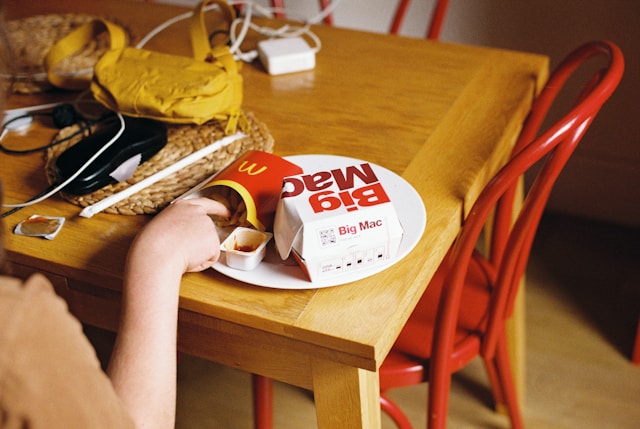Badass vs Dumbass
Master your Financial Kung Fu to be one and not the other.

"McD’s: 1 – Ronin: Goose Egg."
- Ronin
Photo by Martin Katler on Unsplash
Ronin: Sifu! Check out my latest kitchen gadget – the ultimate automatic burrito folder! You gotta love it, am I right? Pure bananas, boss!
Sifu: Ai-ya! I see you’ve been acquiring a lot of these “treasures” lately. What’s up with all this biz?
Ronin: Oh yeah, Sifu! You can’t put a price on convenience.
Sifu: Holy ijut! Actually #1, you definitely can. And your bank account is begging you to stop. You’re buying all this shit that you don’t need. I bet you most of this crap ends up collecting dust before you know it. I know what’s really going on …
Ronin: Whuuuut?
1. Emotional Spending: Band-Aids for Boredom
Sifu: Let’s start with emotional spending. It’s like treating boredom with a credit card. You’re sad, you shop, and for a minute, all’s good. The perfect quick hit of dopamine. Then the thrill wears off, and you’re stuck with something you don’t need.
Ronin: So, next time I’m down, I should meditate or, like, eat an apple?
Sifu: Better than a foolish $200 kitchen gadget that just ate up the last of you counter space.
2. FOMO: The Fearful Spiral
Sifu: The next reason is FOMO. You see your friends online buying things, traveling, upgrading to the latest toy. And suddenly, your perfectly fine life looks dull. You scramble to catch up. You know – “Keeping up with the Joneses” bullshit.
Ronin: You mean like when Tony was showing off his sick euro shades on Insta. But they were so damned cool, bro!
Sifu: And Tony probably doesn’t mention the credit card debt he’s drowning in. FOMO convinces you that you’re missing out, but really, it’s a fast track to financial regret. Slippery slope to Hell, my little man.
Ronin: So, resist the shades … and maybe Tony’s Insta feed?
Sifu: Yes, #1. Time to “Man Up”. Choose financial peace over a fleeting thrill.
Sifu: Then we have instant gratification. One-click shopping has made it way too easy to buy without a thought. Remember the old days when we had to plan and save? Now, it’s “want” to “have” in 30 seconds flat.
Ronin: I feel you, my man. Amazon Prime—both my best friend and worst enemy.
Sifu: And just like junk food, that instant joy fades quickly, leaving you wondering why you bought a double serving of Big Macs, fries and soda at midnight, only to have the runs 2 hours later. Your best story from last week – I’m still cracking up!

Photo by Annie Spratt on Unsplash
Ronin: In my defense, that damned “I’m lovin’ it” jingle was in my head all day!
Sifu: A-ha!
Ronin: McD’s: 1 – Ronin: Goose Egg. FML.
4. Sales: The False Bargain
Sifu: Beware of sales, Padawan. They’re like sirens luring you into unnecessary purchases. Just because something’s 70% off doesn’t mean you need it.
Ronin: Black Friday is my personal Hunger Games. I go in for one thing and leave with 27, half of which I forgot I grabbed.
Sifu: Sales convince you you’re saving, but if you wouldn’t buy it at full price, you’re not saving anything.
Ronin: Doh!
5. Buying for Status: The Debt Trap
Sifu: Lastly, we have “buying to impress others”. People spend on luxury cars, fancy clothes, all to signal success. But true financial strength isn’t about appearances.

Photo by Conor Samuel on Unsplash
Ronin: Roger that, because there’s no better feeling than driving a luxury car while praying for gas prices to drop.
Sifu: Ha! Ronin, it’s more of a warning. Focus on impressing your future self by saving, not trying to impress others with stuff.
Ronin: Got it. No more shopping to keep up with Tony Baloney!
Sifu: Now you’re getting it. Financial freedom > Lunchmeat.
Ronin: Hahaha. Speaking of lunch…
Sifu: Oh crap, here we go.
We’ve all been there—staring at the shiny new gadget, cute pair of shoes, or that trendy kitchen gadget you’ll probably never use. You buy it, even though deep down, you know you don’t need it. The question is: why? The psychology behind overspending is complex, but understanding the triggers can help you make better decisions. Here are some key reasons:
1. Emotional Spending (Retail Therapy)
2. The Fear of Missing Out (FOMO)
3. Instant Gratification
4. The Power of Sales and Discounts
5. Buying as a Status Symbol
Conclusion
Understanding the psychology behind why you buy things you don’t need is the first step in curbing overspending. By identifying emotional triggers and cognitive biases, you can make more mindful decisions and stay on track with your financial goals.
This article is for informational purposes only. It should not be considered Financial or Legal Advice. Not all information will be accurate. Consult a financial professional before making any significant financial decisions.